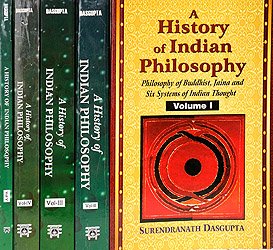A History of Indian Philosophy Volume 4
Indian Pluralism
by Surendranath Dasgupta | 1949 | 186,278 words | ISBN-13: 9788120804081
This page describes the philosophy of interpretation of brahma-sutra i. 1. 3-4: a concept having historical value dating from ancient India. This is the fourth part in the series called the “madhva’s interpretation of the brahma-sutras”, originally composed by Surendranath Dasgupta in the early 20th century.
Part 4 - Madhva’s interpretation of Brahma-sūtra I. 1. 3-4
Śaṅkara gives two interpretations of this sūtra, śāstra-yonitvāt (“because of its being scripture-cause”), expounding the compound “scripture-cause” in two ways, first, as “the cause of the scriptures,” secondly as “that of which the scripture is the cause or source of revelation or pramāṇa.” The force of the first meaning is that Brahman is omniscient not only as being the cause of the production, etc., of the world, but also as being the cause of the revelation of the Vedas, since no one but an omniscient being could be the source of the Vedas, which are the greatest repository of knowledge unfathomable by human intellect. The second meaning suggests that it is the Vedas only which can prove to us that Brahman is the cause of the production, etc., of the world[1].
The Madhvas accept the second meaning and object to the first, on the ground that His being the source of the Vedas does not in any way add anything to His omniscience beyond what was implied in His being the cause of the production, etc., of the world, as described in the first sūtra[2]. The commentators on Madhva’s Bhāṣya and Anuvyākhyāna, Jaya-tīrtha, Vyāsa-tīrtha and others, following Madhva’s explicit statements, argue in detail that the word “scripture” (śāstra) in the sūtra means the Vedas Rk, Sāman, Yajus and Atharva, and not the Śaiva āgamas, which hold that Śiva is the cause of the production, etc., of the world[3]. The Madhva commentators try to emphasize the fact that inference by itself is helpless to prove Brahman to be the cause of the production, etc., of the world.
Sūtra I. 1.4. Śaṅkara here supposes a mīmāmsā objection that the Vedas cannot have for their purport the establishing of Brahman, since they are always interested in orders and prohibitions with reference to some kind of action. He refutes it by saying that a proper textual study of the Upaniṣads shows that their principal purport is the establishing of pure Brahman, and that it has no connection whatever with the performance of any action.
Madhva holds that this sūtra (tat tu samanvayāt, “that however through proper relationing”) means that it is intended to indicate that all the scriptures (śāstra) agree in holding Viṣṇu as Brahman and the ultimate cause, and not Śiva or any other gods, as held by others. The mīmāṃsā objection and Śaṅkara’s own views are, of course, all rejected on grounds similar to those already dealt with in the first sūtra[4].
Footnotes and references:
[1]:
śāstrād eva pramāṇāj jagato janmādi-kāraṇam brahma adhigamyate.
Bhāṣya of Śaṅkara, I. 1.3.
[2]:
kathaṃ ca ananta-padārthakasya prapañcasya kartṛtvena na sphuṭaṃ tad-eka-deśa-veda-kāraṇatvena sphuṭībhaviṣyati sarvajñam.
Jaya-tīrtha further argues that there is no such concomitance whereby from the authorship of the Vedas omniscience can be inferred. Again, if the authorship of the Vedas means the literary composition representing facts known by sense experience or inference, it must be admitted that the Vedas have been composed like any other ordinary book (pauruṣeya); and, if the authorship means only utterance like that by a teacher, that may not mean even a thorough knowledge of the contents of the Vedas. Nyāya-sudhā, pp. 111, 112.
[3]:
The other scriptures which the Madhvas admitted as authoritative are the Pañcarātra, Mahābhārata and Rāmāyaṇa and not the Sāṃkhya, Yoga or Pāśupata.
Thus Madhva says in his Bhāṣya:
Ṛg-yajuḥ-sāmātharvaś ca bhārataṃ pañca-rātrakam, mūla-rāmāyaṇaṃ caiva śāstrāṇīty abhidhīyate.
Whatever else agrees with these has to be accepted as valid, and the other so-called scriptures have to be rejected. The Pañcarātra and the Vedas are in thorough agreement, and therefore the word śāstra in the sūtra refers to the Pañcarātra; so that by declaring the validity of the Pañcarātra alone the Vedas, which agree with it, are also accepted as valid, but everything else which is in disagreement with it is rejected.
Thus Madhva says in his bhāṣya on this sūtra:
veda-pañcarātrayor aikyābhiprāyeṇa pañca-rātrasyaiva prāmāṇyam uktam.
[4]:
See Tātparya-candrikā (on I. 1. 4), pp. 201-4.
